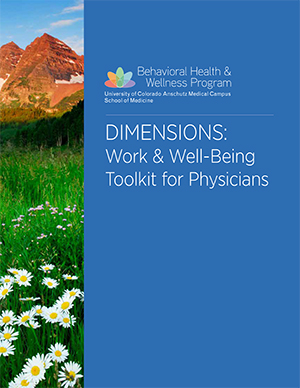Colorado Medical Society
http://dev.cms.org/articles/make-time-for-wellness/Make time for wellness
Thursday, January 01, 2015 11:31 AM
Editor’s note: This column originally appeared in the Colorado Psychiatric Society (CPS) quarterly newsletter, “A Piece of Our Mind,” Winter 2014, Vol. 40, No. 4. It has been reprinted with permission.
The president’s column this quarter consists largely of a wholesale, mindful “cut and paste” from out of one of the most delightful surprises of my long association with the Colorado Psychiatric Society. Last month I received, for review and distribution to all members, the 47-page, wonderfully illustrated and thoughtfully done, evidence-based “DIMENSIONS: Work and Well-Being Toolkit for Physicians” containing a number of useful educational resources:
- A low-burden tool for measuring readiness to change to achieve wellness.
- Step-by-step instructions for developing skills to assess one’s wellness.
- Evidence-based strategies for improving wellness.
- Suggestions for maintaining wellness.
The Colorado Medical Society presented the toolkit – developed in partnership with the Behavioral Health and Wellness Program at the University of Colorado Anschutz Medical Campus – to all component and specialty societies in Colorado as a goodwill gift to all physicians.
Like so many professionals, the time and energy to read, much less commit to such a reevaluation and reworking of one’s careers, is beyond most all of us given our long days and late nights. After you finish up your medical records, your collateral contacts, your releases of information, your insurance payers’ paperwork, your committee work, your MOC work, and so forth, protecting the time (and mental energy) to take time to be well seems a continuing casualty of our modern, electronically enhanced, physician-hood.
As psychiatrists we know better.
But do we do better?
One quiet evening, please take the time to review the entire work and well-being toolkit: www.cms.org/resources/
category/physician-wellness. Then, as a favor to yourself, your patients and colleagues, and especially to the people who don’t pay you to be with them, spend the rest of your life applying the carefully outlined pathways. There are many to choose from in the toolkit.
Factors that influence physician well-being
There are several factors that influence the well-being, or lack thereof, of a physician. In 2013, Friedburg and colleagues found that two major frustrations physicians face are in working with electronic health records (EHRs) and providing quality health care. These two frustrations, beyond all others, contribute to physicians’ experience of career dissatisfaction.
Electronic Health Records (EHR)
While EHRs may eventually be a powerful tool for interconnectivity, currently EHRs often contribute significantly to a physician’s decreased level of satisfaction and well-being at work. Poor EHR usability, confusing interfaces, time-consuming data entry, interference with direct patient care, problems communicating with other professionals, and degradation of documentation are major frustrations physicians report having with EHRs. Although physicians agree with the concept of an EHR, they regularly report that in practice EHRs do not meet the goals of increased access to patient information, streamlined diagnosis and treatment, or improving the quality of care.
Quality patient care
Competing demands: Physicians must find a delicate balance between providing quality health care to patients and meeting the demands of third-party payers. These third-party payers sometimes deny coverage for a patient even when a treatment has been prescribed by a physician. When this occurs, physicians must make a difficult decision regarding whether to carry out their prescribed treatment, follow the directive of the managed care company, or appeal, which takes precious time. Other instances of competing demands occur when practice leadership is unsupportive of new ideas or has unrealistic expectations regarding the number of billed patients seen. Another competing demand is balancing the commitment of time and energy between work and home life.
Workload: Physicians who have more control and autonomy over their workflow report greater well-being and satisfaction. When physicians can appoint their own colleagues, have control over their schedule, and see the type of patient they wish, in the time period they wish, they are happier with their work situation overall.
Working with other physicians: Relationships between physicians can also have significant effects on well-being and satisfaction with work. When physicians feel respected, perceive teamwork among providers, and feel they are compensated well, they report feeling more satisfied with their profession.
Other factors: Additional factors that are associated with physician resilience include a sense of contribution, maintaining an interest in the field, appropriate use of acceptance-versus-change-related coping skills, self awareness, ability to set appropriate limits, attending to personal care (exercise, recreation, spirituality), and personal support (family, friends and colleagues).
Dr. Christenson is president of CPS and is actively engaged in psychiatric medicine on the northern Front Range of Colorado.